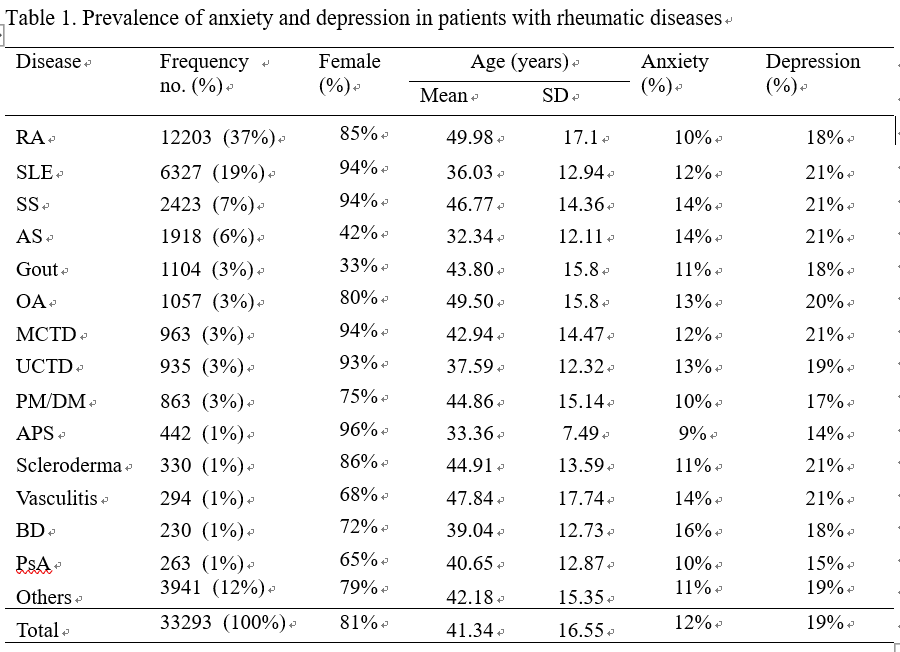Session Information
Session Type: Poster Session (Monday)
Session Time: 9:00AM-11:00AM
Background/Purpose: The patients with chronic diseases such as rheumatic diseases suffer from physical pain and/or disability. In addition, psychological morbidities have also been found in patients with rheumatic diseases. Hospital Anxiety and Depression Scale (HADS) is commonly applied to assess the mental health of patients with rheumatic diseases.
Smart System of Disease Management (SSDM) is a mobile application which has two application systems for both patients and doctors for rheumatic diseases management. The patient application system provides functions including self-assessment, medication management, adverse events management and laboratory records. After input by patients, all the data will be synchronized to the mobile terminal of authorized rheumatologists. Based on these data, rheumatologists can evaluate and follow up with their patients and provide consultation service through SSDM via text or voice message. The rheumatologists can also adjust therapeutic regimens based on patients’ profiles.
The purpose of this study is to explore the profile of psychological morbidities in patients with rheumatic diseases.
Methods: The patients were educated and trained to perform HADS assessments using SSDM by the rheumatologists. The HADS self-assessments data could be extracted from the mobile terminal for further analysis. The HADS scale consists of two subscales for anxiety (HADS-A) and depression (HADS-D) which have 7 items, respectively. Both subscales range from 0 to 21, with higher scores indicating greater anxiety and depression. A score between 11 and 21 indicates a probable case of anxiety or depression.
Results: From June 2016 to May 2019, 33,293 adult patients (82% females; 18% males) with a mean age of 41.34 ± 16.55 years from 380 hospitals performed self-evaluation of HADS using SSDM. 34 rheumatic diseases were assessed, including RA (12,203; 37%), SLE (6,327; 19%), SS (2,423, 7%), AS (1,918; 6%), gout (1,104; 3%), OA (1,057; 3%), MCTD (963; 3%), UCTD (935; 3%), PM/DM (864; 3%), etc.
Table 1 presents the number and percentage of patients with rheumatic diseases accompanied by anxiety or depression. The ratio of probable anxiety was 10% in RA, 12% in SLE, 14% in SS, 14% in AS, 11% in Gout, 13% in OA, 12% in MCTD, 13% in UCTD and 10% in PM/DM. The prevalence of probable depression was 18% in RA, 21% in SLE, 21% in SS, 21% in AS, 18% in Gout, 20% in OA, 21% in MCTD, 19% in UCTD and 17% in PM/DM.
Conclusion: SSDM can be used for HADS self-assessments by patients with rheumatic diseases. RA was recorded as the most prevalent condition, followed by SLE. 10% to 21% patients could be classified as probable case of anxiety or depression according to HADS scores. The prevalence of anxiety was usually lower than that of depression in patients with rheumatic diseases in this study.
To cite this abstract in AMA style:
Wang Y, Wu J, Li Y, Wu H, li Y, Wei H, Chen X, Wu B, li Z, Ru J, Fan W, Li S, He F, Zhao Y, Li F, Wu B, Wang F, Zhang M, Kang L, Xiao H, Jia Y, Wu B, Xiao F, Song H. Psychological Profile in Patients with Rheumatic Diseases in China: A Study of HADS Self-assessment with Smart System of Disease Management (SSDM) [abstract]. Arthritis Rheumatol. 2019; 71 (suppl 10). https://acrabstracts.org/abstract/psychological-profile-in-patients-with-rheumatic-diseases-in-china-a-study-of-hads-self-assessment-with-smart-system-of-disease-management-ssdm/. Accessed .« Back to 2019 ACR/ARP Annual Meeting
ACR Meeting Abstracts - https://acrabstracts.org/abstract/psychological-profile-in-patients-with-rheumatic-diseases-in-china-a-study-of-hads-self-assessment-with-smart-system-of-disease-management-ssdm/

